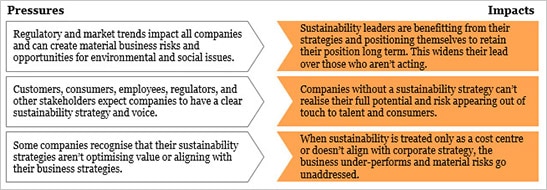Sustainability has become a major focus for companies and is being integrated into strategic planning. Sustainability can be part of your strategy to balance issues such as dealing with regulations, protecting your brand and company image, keeping a strong supply chain, and improving business performance.
Developing a detailed sustainability vision, goal, and values and integrating them into your long-term strategic planning is challenging. Using them to build public trust is a further challenge.
But focusing on sustainability can help to protect your reputation, stimulate innovation and market differentiation, and improve employee engagement. A sustainability strategy also satisfies consumers, attracts talent, demonstrates compliance, and communicates progress to stakeholders – all key ingredients for long-term growth and profitability.
Your sustainability strategy should give you a competitive advantage

We can help you:
- determine what and where your pressures are, and what needs to be done to make your business more sustainable
- prioritise your sustainability and commercial issues
- identify and manage the challenges of implementing or improving your sustainability strategy
- identify opportunities to improve efficiency and revenue potential, and increase growth
- identify and measure the impact your business has on the environment, society, and the economy through metrics and assessing sustainability using our Total Impact Measurement and Management Framework (TIMM)
- map your short- and long-term goals for sustainability and assess the risks and look at how you can achieve your goals
- insert your sustainability strategy into your overall corporate strategy, and
- follow your sustainability programme using prioritised initiatives, milestones, and measurable targets such as key performance indicators.
Case studies
- Creating shared value (CSV) and community engagement strategies
- Sustainability strategy development
- Sustainability-adjusted valuation and societal impact
Creating shared value (CSV) and community engagement strategies
Challenge: The Board decided that the company needed to develop CSV and community engagement strategies. The objective was to increase the impact of their social investment and business initiatives to develop community trust and gain a social licence to operate.
Solution: We helped their team develop their CSV and corporate social responsibility (CSR) master plan and roadmap. For the CSV strategy, we analysed global and local trends, stakeholders, and client-specific issues, researched industry peers and SV leaders to set benchmarks, and developed and tested the CSV framework, initiatives, scoring criteria, and roadmap.
Results: We developed a group-wide, five-year CSV and CSR master plan, that included the client’s CSV vision, mission, objectives, goals, and KPIs. The master plan helped to improve budget management and showed the positive impact of sustainability initiatives.
Sustainability strategy development
Challenge:The client wanted to put in place a sustainability strategy to distinguish itself in the market.
Solution:We prioritised the client’s sustainability focus areas through gathering information on stakeholders, identifying risks and issues in the aviation industry and defining the value drivers for sustainability
Results:Together, we established annual targets and goals, and developed a roadmap to implement the sustainability initiatives.
Sustainability-adjusted valuation and societal impact
Challenge:The client wanted to account for the ESG (Environmental, Social and Governance) factors involved in the true value that the organisation generates. It specifically wanted to understand the ESG impact on its portfolio companies, proactively manage material ESG issues, integrate ESG into management decision-making, and motivate others in the industry to debate and recognise ESG impact on business value.
Solution:We determined a value impact based on the company’s sustainability performance against each ESG indicator and the societal impact of each pilot company. We also developed an implementable framework to help identify ESG indicators and their corresponding value impact.
Results:We promoted the advanced understanding of the impact of ESG factors on company base value (sustainability-adjusted value) and the impact of their investee companies on society (Total Impact Measurement & Management).
Contact us

Chayathorn Chanruangvanich
ESG and Corporate Sustainability Leader, PwC Thailand
Tel: +66 (0) 64 556 4545, +66 (0) 2844 1000






